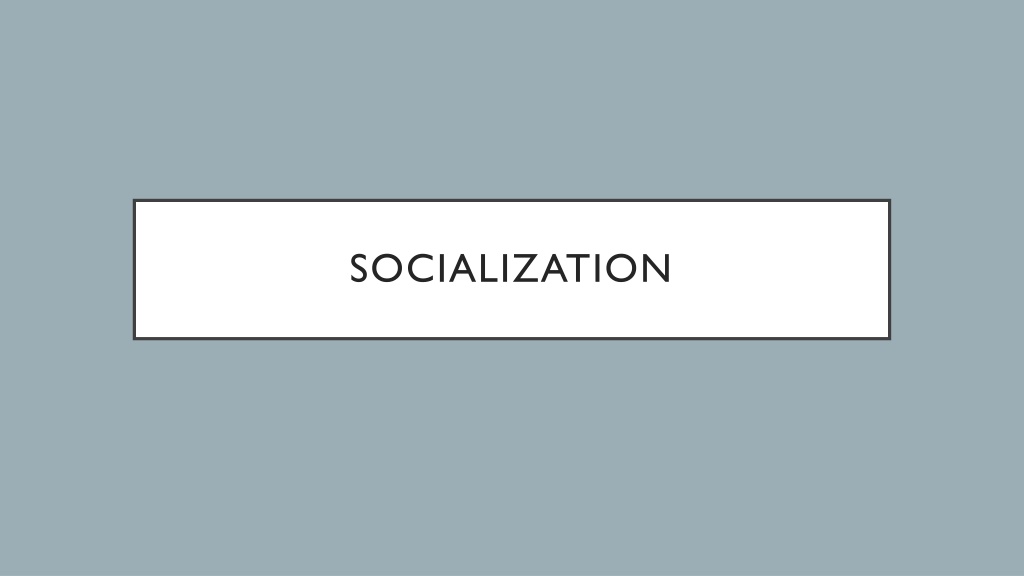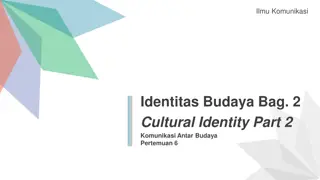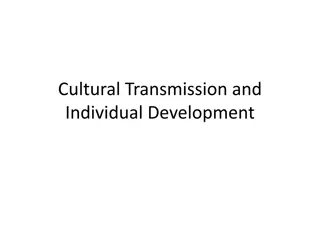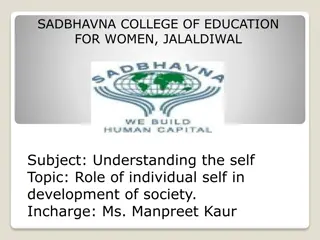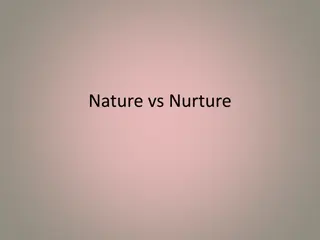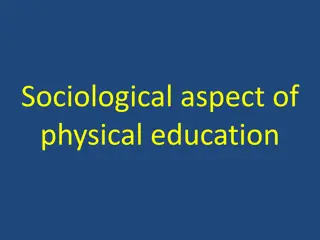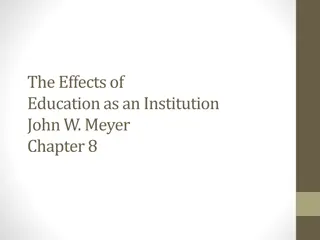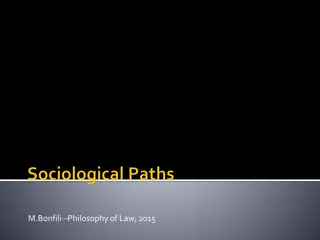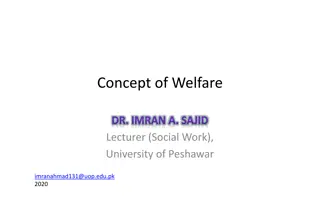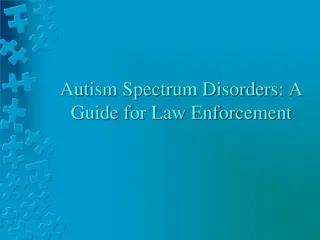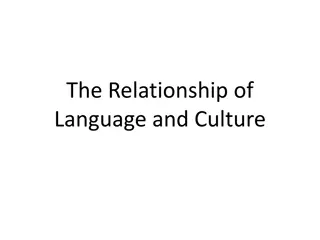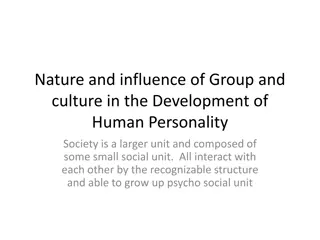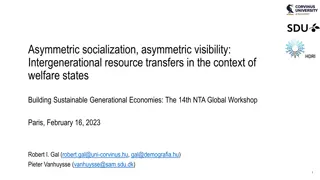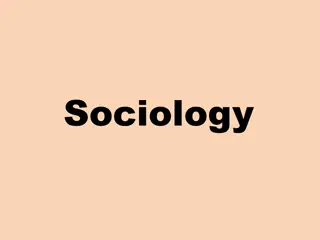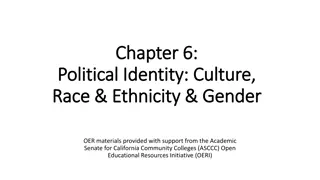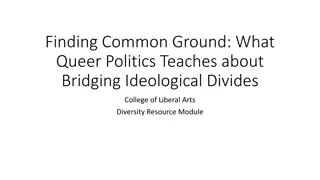Understanding Socialization: Impact on Individuals and Society
Socialization is the process of learning to participate in groups, starting from birth and continuing throughout life. It is crucial for individual development. Social isolation can have detrimental effects, as seen in case studies like Anna, Isabelle, and Genie. Different perspectives like functionalist, conflict theory, and symbolic interactionism shed light on how socialization influences social institutions, control, and interactions.
Download Presentation

Please find below an Image/Link to download the presentation.
The content on the website is provided AS IS for your information and personal use only. It may not be sold, licensed, or shared on other websites without obtaining consent from the author. Download presentation by click this link. If you encounter any issues during the download, it is possible that the publisher has removed the file from their server.
E N D
Presentation Transcript
DEFINITION The process of learning to participate in a group Begins at birth and continues throughout life Very important to the development of an individual
EFFECTS OF SOCIAL ISOLATION Harry Harlow monkey experiments Infants raised in isolation become withdrawn, hostile adults Closeness and comfort seem to be more important than food Physical contact teaches how to form emotional ties
CASE STUDIES ON ISOLATED CHILDREN
ANNA Found in 1938 6 years old Kept in isolation and lacked ability to move Lacked care and comfort and mental abilities suffered
ISABELLE Similar to Anna Mother stayed with her, however Quickly learned socialization skills Theory: she had contact with the mother and was more prepared than Anna
GENIE Kept in isolation from age 2 until 14 Behavior was subhuman when discovered Abnormal brain waves and inability to speak Genie s case led to theory that if language is not learned by adolescence, it might not be attainable
FUNCTIONALIST PERSPECTIVE Focuses on how socialization maintains social institutions Stresses the way groups work together to create a stable society
CONFLICT THEORY PERSPECTIVE Focuses on how socialization plays a role in social control Socialization is a way to keep the status quo Teach social status before you have enough self-awareness to realize what s happening This maintains advantages of higher classes
SYMBOLIC INTERACTIONISM AND SOCIALIZATION
SELF-CONCEPT Def: an image of yourself as having an identity separate from other people We learn to judge ourselves in terms of how we imagine others will react to us
LOOKING-GLASS SELF LOOKING-GLASS SELF: a self- concept based on our idea of others judgments of us 3 stage process: 1) our perception of how others see us 2) we imagine the reactions of others to our appearance 3) we evaluate ourselves according to how we have imagined others have judged us
SIGNIFICANT OTHERS Def: those people whose reactions are most important to your self-concept Teens place heavy reliance on their peers
ROLE TAKING Def: assuming the viewpoint of another person and using the viewpoint to shape their self-concept Helps us anticipate what others will do and say
ROLE TAKING CONTINUED 3 stages: 1) Imitation stage: children imitate behaviors w/o understanding why 2) Play stage: children take on roles of others one at a time 3) Game stage: children anticipate the actions of others based on social rules
GENERALIZED OTHER Def: integrated conception of the norms, values, and beliefs of one s community or society This takes place during the game stage We depend less on individuals and more on general concepts
THE ME AND THE I ME: the part of the self formed through socialization I: part of the self that accounts for unlearned, spontaneous acts
THE FAMILY Primary agent of childhood socialization You learn to think and speak from them To internalize beliefs, norms, and values They form your basic attitudes They develop your capacity for intimate and personal relationships You acquire a good portion of your self- image through them
FAMILY AND GENDER ROLES Family teaches society s appropriate gender roles Parents aren t aware they are The toys they buy, the actions they perform Play patterns they encourage
FAMILY AND SOCIAL CLASS Working-class are more likely to use physical punishment than middle-class Middle-class tend to worry more about fostering curiosity, self-control, and self- expression Not all conform to this Why do you think that is?
RELIGION Religious values play a role even if you don t go to church (invisible religion) Teaches aspects of group life Influences views on sexuality, proper gender roles, work, and child-rearing
SCHOOLS Teaches to be less dependent on parents Creates feelings of loyalty and allegiance to something beyond the family HIDDEN CURRICULUM: informal and unofficial aspects of culture that children are taught in school Discipline, order, cooperation, and conformity
PEER GROUP SOCIALIZATION PEER GROUP: ppl roughly the same age and with same interests Give-and-take relationships Conflict, competition, and cooperation Promote independence Create close ties outside the family
MASS MEDIA Def: means of communication designed to reach the general population TV, radio, Internet, movies, books, etc Display role models Offer values of society (good or bad) Propaganda Effects are subtle
SOCIALIZATION THROUGH THE LIFE CYCLE
CHILDHOOD Industrialization changed the view of childhood Today we view children as dependent and in need of guidance, protection, and schooling
ADOLESCENCE Def: the stage of development between childhood and adulthood Universal education system, exclusion of young ppl from work force, emergence of juvenile justice system, competition to get a college degree have prolonged adolescence
ADOLESCENCE AND THE SELF-CONCEPT Several psychological challenges: Undefined status Increased decision-making (supposed to be more responsible) Increased feelings of pressure Quest for identity (not totally dependent but not totally independent)
OTHER CHALLENGES TO ADOLESCENCE Dating Sexuality Drug use Eating disorders Must develop skills that analyze cause and effect as well as evaluate risk
TRANSITIONAL ADULTHOOD Def: after high school; still have not assumed responsibilities associated with adulthood (age 18-29) Not financially independent RITES OF PASSAGE: rituals marking the passage from one status to another Challenge: entering into loving, committed relationships with others in order to partially replace parental bonds (intimacy vs. isolation---Erik Erikson)
MIDDLE YEARS Age 30-49 Family and employment are the hallmarks Later middle years (50-64), a reorientation occurs Focus shifts to how much time you have left
OLD AGE Age 65-75 Called the transitional older years Body and mind don t function as sharply as they once did Retirement can lead to feelings of isolation Integrity vs. despair (Erik Erikson)
DEATH AND DYING Elisabeth-K bler Ross gave us the 5 stages of grieving: 1)Denial 2)Anger 3)Bargaining 4)Depression 5)Acceptance Don t have to follow in order Hospice care now more common
DESOCIALIZATION Def: process of giving up old norms, values, attitudes, and behaviors Takes place in TOTAL INSTITUTIONS: places in which ppl are separated from the rest of society and controlled by officials in charge (military boot camps, etc )
RESOCIALIZATION Def: process of adopting new norms, values, attitudes, and behaviors Creating a new identity Rewards for taking on new identity, punishment for not
ANTICIPATORY SOCIALIZATION Def: voluntary process of preparing to accept new norms, values, attitudes, and behaviors Usually occurs as you transition from one stage to another Begins in preadolescence as you adopt a new REFERENCE GROUP: group with whom you identify
